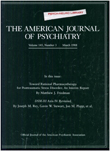Miranda comes to the hospital: the right to remain silent in civil commitment
Abstract
One procedural protection that has not generally made the transition from the criminal justice system to involuntary civil commitment is the Fifth Amendment protection against self-incrimination. The authors present the results of a study of the implementation of the right to remain silent, which demonstrate that warning patients that anything they say may be used against them in the commitment hearing has little impact on their willingness to talk to staff or to cooperate with treatment. The authors discuss the possible reasons for their findings.
Access content
To read the fulltext, please use one of the options below to sign in or purchase access.- Personal login
- Institutional Login
- Sign in via OpenAthens
- Register for access
-
Please login/register if you wish to pair your device and check access availability.
Not a subscriber?
PsychiatryOnline subscription options offer access to the DSM-5 library, books, journals, CME, and patient resources. This all-in-one virtual library provides psychiatrists and mental health professionals with key resources for diagnosis, treatment, research, and professional development.
Need more help? PsychiatryOnline Customer Service may be reached by emailing [email protected] or by calling 800-368-5777 (in the U.S.) or 703-907-7322 (outside the U.S.).



